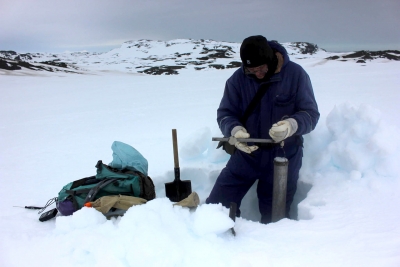What is the career in glaciology?

Imagine working in one of the coldest and most remote, but most breathtakingly beautiful, areas of the world. Armed with a crash helmet and climbing harness, you are slowly lowered into one of the ice crevasses of a surging glacier. Your mission: to examine the effect of climate change on the icy mass.
Sounds interesting, does it not? With glaciers around the world disappearing at an alarming rate and causing sea levels to rise, the hitherto obscure field of glaciology has now become extremely important. Glaciologists assess the impact of climate change, look for alternatives to sustain Earth's depleting resources, forecast avalanches and save the world, one glacier at a time.
What is glaciology?
Glaciology is a branch of environmental science that deals with snow and ice. More specifically, glaciologists study glaciers. They closely monitor the formation, movement of different kinds of glaciers such as alpine and arctic glaciers, ice caps, ice sheets and ice shelves.
A large part of the research conducted by glaciologists analyses how glaciers and ice caps move and change in response to climate change and how these changes, in turn, influence climate and the surrounding environment.
Required Skills
- Passion for mountains
- Adventurous spirit
- Research and analytical skills
- Scientific temperament
- Working knowledge of snow equipment
- Willingness to do field as well as lab studies
- Physical fitness to work in high altitudes for prolonged durations
Branches
- Study of glaciers
- Reconstructing past climates
- Hydrology: monitoring the melting of glaciers
- Avalanche study
What to study:
After graduating from the Science stream with Physics, Chemistry Biology or Geology you can specialise in glaciology and further work as research fellows at the following institutes:
NOTE: A PhD will help you excel in this field.
Where:
- National Centre for Antarctic and Ocean Research, Goa
- Jawaharlal Nehru University's School of Environmental Sciences/School of Geography, New Delhi
- Indian Institute of Science, Bengaluru
- Tata Institute of Fundamental Research, Mumbai
- Snow and Avalanche Study Establishment Research Centre, Chandigarh and Manali
- Wadia Institute of Himalayan Geology, Dehradun offers glaciology training
What are the job prospects?
Glaciology can be a never- ending adventure as you get to work in a variety of locations such the office, lab and even in some of the most extreme places in the world such as Antartica, Greenland or the Himalayan peaks, where few dare to venture.
Many government institutes conduct research on glaciers. You can join them as a research fellow or a scientist after completing your postgraduation.
Of late, plenty of opportunities have opened up in the private sector too. You can work with NGOs taking on projects on climate change, building avalanche- resistant structures, disaster management or framing environmental policies.
Did you know?
- In December 2020, the world's biggest iceberg, the size of a small city, broke in two in Antarctica and is on a collision course with South Georgia Island, a wildlife refuge in South Atlantic Ocean.
- In February 2020, a massive iceberg broke off Antarctica's Pine Island Glacier.
Picture Credit : Google